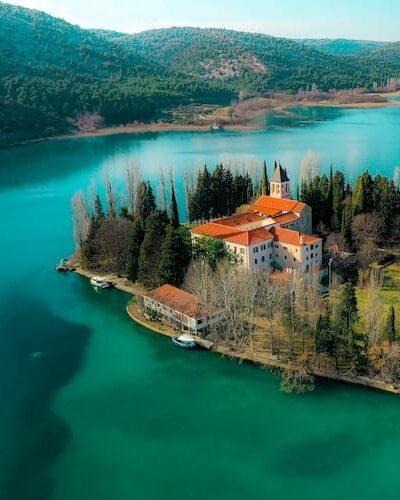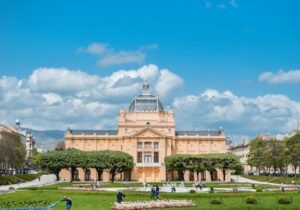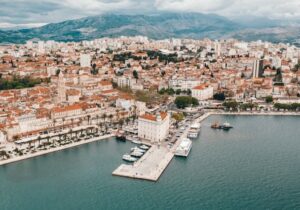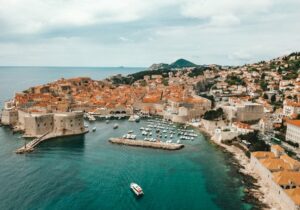Did you know Croatia has more than 1,000 islands? Thanks to its proximity to the Adriatic Sea and pleasant Mediterranean climate, Croatia is a popular tourist destination in the Balkans. This country is also emerging as a go-to destination for digital nomads thanks to its new digital nomad visa program.
The Croatia Digital Nomad Visa allows foreign remote workers to live and work in Croatia for up to a year, with a possibility for renewal.
It offers tax benefits on foreign-sourced income, aiming to attract digital nomads with the allure of Croatia’s high quality of life, beautiful landscapes, and vibrant culture. Read on to learn more about the Croatia digital nomad visa, how to apply, and what to expect when working remotely in the Balkans.
What is the Croatia Digital Nomad Visa?
The Croatia Digital Nomad Visa, formally known as the “Temporary Stay of Digital Nomads,” is a visa program introduced by Croatia to attract remote workers from around the world.
The Croatian Digital Nomad Visa allows foreign nationals who are employed or performing work remotely for a company or their own business that is not registered in Croatia, to stay in the country for up to one year.
Please note that the digital nomad visa does not allow you to seek labor for a Croatian company or business. It’s a type of residence permit that you can apply for if you want to work as a freelancer or entrepreneur in Croatia.
Benefits of the Digital Nomad Visa Croatia
A Croatia digital nomad visa allows you to live in Croatia while supporting yourself. You can stay up to a year, which gives you plenty of time to familiarize yourself with Croatian culture and experience the country like a local. It comes with it a host of benefits designed to attract remote workers from around the globe. Here are some key advantages:
Tax Benefits: One of the most significant perks is the tax exemption on foreign-sourced income. Digital nomads living in Croatia under this visa do not pay Croatian income tax on the income they earn from employers or clients outside of Croatia. This makes financial planning and management more straightforward and potentially more beneficial, depending on the tax laws in the nomad’s home country or country of employment.
Family Inclusion: Digital nomads can include their immediate family members in their application. They must provide a marriage certificate (apostilled/legalized, officially translated) or prove that they are in a common-law marriage as part of the application for spouses. Birth certificates must be provided for applicants seeking to include their children.
Duration and Renewability: The visa allows for a stay of up to one year, which is more extended than the typical tourist visa. Moreover, there’s potential for renewal, offering flexibility for those who wish to extend their stay in Croatia.
Work-Life Balance: Croatia boasts a high quality of life, with access to stunning natural landscapes, historical sites, and a vibrant cultural scene. Digital nomads can enjoy a balance of work and leisure, exploring the country’s beautiful coastlines, national parks, and urban centers.
Connectivity and Community: Croatia offers a good standard of living with reliable internet connectivity, which is crucial for remote work. There’s also a growing community of digital nomads, facilitated by coworking spaces, networking events, and social gatherings, helping newcomers integrate and find a sense of community.
Access to Schengen Area: While Croatia is part of the European Union, it is also set to join the Schengen Area, which would allow visa holders easier access to travel across most of Europe, enhancing the opportunity for travel and exploration while working remotely.
Healthcare Access: Applicants must have health insurance coverage for the duration of their stay, ensuring access to healthcare services while in Croatia. This requirement helps mitigate any concerns about healthcare while living abroad.
Safety and Stability: Croatia is known for its safety and political stability, making it an attractive destination for those looking to live and work remotely in a secure environment.
Cultural and Environmental Diversity: From ancient walled cities like Dubrovnik to the pristine waters of the Adriatic Sea, Croatia offers a diverse range of environments to explore. Digital nomads can choose to work from a bustling city, a serene coastal town, or a quiet countryside village.
Croatia Digital Nomad Visa Eligibility Criteria
Who is eligible for the Croatian digital nomad visa? First of all, you must have a remote job with a company registered outside of Croatia (i.e., not a Croatian company). You can work remotely for your business as long as you register it in another country.
Some passports make you ineligible for this program. If you’re a citizen of an EU or EEA country or have a Swiss passport, you’ll have to apply for a temporary residence permit instead. You won’t need to apply for a Croatian visa if you have a Croatian passport.
Having a criminal record also makes you ineligible.
Croatia Digital Nomad Visa Requirements

You can prove that you meet the Croatia digital nomad visa income requirements by showing a bank statement with enough money to support yourself during your entire stay, or submitting pay slips for the past six months showing you earn at least $2,713 a month.
To be eligible for the Croatian Digital Nomad Visa, applicants must meet several criteria:
- Proof of Remote Work: Applicants must work for a company or clients that are not registered in Croatia and perform work through telecommunication technology.
- Financial Stability: They must demonstrate sufficient financial means to support their stay. As of my last update, this was set at a minimum of approximately EUR 2,500 per month, but it’s advisable to check the latest requirements as this figure may change.
- Health Insurance: Comprehensive health insurance coverage for the duration of the stay in Croatia is mandatory.
- Clean Criminal Record: A background check is conducted, and applicants must not have a criminal record in their home country or any country where they have resided for more than a year in the past five years.
- Valid Passport: A passport that remains valid for the duration of the intended stay. The expiration date shouldn’t exceed the end of your stay by more than three months.
Croatian immigration officials will also want to see proof of residence, such as a rental agreement with your address in Croatia (note that this can be a temporary address) and proof of insurance from a private insurer.
How to Apply for a Croatian Digital Nomad Visa
The visa application process is simple. You’ll need a valid passport, proof of income, proof of health insurance, a statement describing the purpose of your visit, your criminal record, and proof of residence. Note that you’ll need to submit documents in English and Croatian.
As a US citizen, you can enter Croatia without a visa and stay for 90 days to visit the country. Once inside Croatia, you can apply for a Croatia remote work visa in-person at a local police station. If you want to apply for your Croatia digital nomad visa before entering the country, there are two options available.
Apply at the Croatian Embassy
Croatia has over 50 embassies, including 11 in the US You can call the closest Croatian Embassy and schedule an appointment. You can submit your application form in person, submit your supporting documents, and pay the application fee during your appointment.
Apply online
There is a convenient online platform where you can apply for your Croatia digital nomad visa and upload your supporting documents. Start this process by filling out the Croatia digital nomad visa apply form with your personal information, country of citizenship, and more. The platform will prompt you for the required documents and the application fee.
Note that if you need a visa to enter Croatia, once you have been told that your temporary stay is granted, you will need to contact the Croatian Embassy or consulate a second time to obtain a visa that allows you to enter the Republic of Croatia or a biometric residence permit.
We recommend asking if the option of getting a biometric residence card is possible at the Croatian Consulate or embassy. With either option – biometric residence card or temporary visa – this will act as a visa to enter Croatia.
Where should I stay in Croatia as a digital nomad?
Croatia offers a range of locations that cater to different lifestyles and preferences for digital nomads, from vibrant cities to serene coastal towns. Remote workers tend to favor major cities and coastal areas. Living in a city gives you access to public transit and walkable areas.
Plus, staying in the coastal region allows you to make the most out of the amazing Mediterranean weather. Here are some of the best places to live in Croatia as a digital nomad:
Zagreb

The city is characterized by its Austro-Hungarian architecture, vibrant street markets, and an array of museums and galleries that testify to its long-standing tradition in arts and culture.
The capital city is a hub for digital nomads, offering a blend of historical charm and modern amenities. It’s known for its vibrant café culture, tech scene, and numerous coworking spaces. The city’s rich cultural life, with festivals, museums, and events, ensures there’s always something to do.
The historic Upper Town (Gornji Grad) offers narrow cobblestone streets, the iconic St. Mark’s Church, and sweeping views of the city, while the modern Lower Town (Donji Grad) is known for its bustling squares, parks, and shopping districts.
With its lively café culture, numerous parks, and festivals, alongside a growing digital nomad community supported by excellent internet connectivity and coworking spaces, Zagreb presents an appealing mix of tradition and modernity for residents and visitors alike.
Split

This historic core is a labyrinth of narrow stone streets, bustling with cafes, shops, and bars, all echoing the lives of the emperors who once walked these paths.
Beyond its historical allure, Split is a gateway to the idyllic Dalmatian islands, making it a perfect base for exploring the surrounding natural beauty, including pristine beaches and clear blue waters.
The city’s Riva, a bustling seafront promenade, is the heart of its social life, where locals and visitors alike gather to enjoy the sun, sea, and leisurely café culture.
With a backdrop of coastal mountains and a blend of Roman heritage and modern lifestyle, Split offers a compelling mix of relaxation and cultural exploration, making it a favorite among travelers, expatriates, and digital nomads seeking the Mediterranean charm.
Dubrovnik

This UNESCO World Heritage site is encircled by magnificent medieval walls that have protected its sophisticated baroque buildings, marble streets, and ancient city gates for centuries.
Nestled on the southern tip of Croatia, Dubrovnik offers breathtaking views of the Adriatic Sea, making it a scenic haven for visitors. The city’s history as a prosperous and autonomous maritime republic has left it with a unique cultural legacy, evident in its many churches, monasteries, museums, and palaces.
Dubrovnik’s Old Town, free of vehicular traffic, is a treasure trove for history enthusiasts, while its beaches and clear blue waters appeal to those looking to relax by the sea.
Renowned for its vibrant cultural scene, the city hosts the annual Dubrovnik Summer Festival, showcasing live plays, concerts, and games. Dubrovnik’s blend of historical charm and natural beauty, coupled with its modern hospitality offerings, makes it a captivating destination for travelers from around the globe.
Digital Nomad Valley in Zadar
The Digital Nomad Valley is a community of remote workers in the Borik neighborhood of Zadar. It’s a unique community where people can stay for weeks or months.
The goal is to offer comfortable living spaces and co-working amenities to people visiting the country on a digital nomad visa. The community organizes activities and allows you to connect with other remote workers.
It’s a flexible option that can enhance your stay in Croatia and help you connect with people eager to explore Zadar and its surrounding areas with you!
Other great locations for a digital nomad to live in Croatia
Rovinj: This picturesque town in Istria is known for its Italian influence, cobblestone streets, and artistic vibe. Rovinj is smaller and quieter than Zagreb or Split but offers a charming atmosphere, excellent seafood, and proximity to natural parks.
Hvar: For those who prefer island life, Hvar offers sunny weather, beautiful beaches, and a laid-back lifestyle. It’s more seasonal compared to mainland cities but offers a great community for yachting, sea kayaking, and other water activities.
Osijek: Located in Eastern Croatia, Osijek is an excellent option for digital nomads looking for a quieter life. The city is known for its green spaces, baroque buildings, and lower cost of living compared to the coastal cities. It has a tight-knit community and offers a genuine Croatian experience.
Digital Nomads taxes in Croatia

However, to be eligible, digital nomads must prove that they work for a company not registered in Croatia, and they have sufficient means to support themselves without entering the local labor market.
Regarding taxes, Croatia has implemented specific regulations for digital nomads that are quite advantageous. Digital nomads are exempt from income tax in Croatia on their foreign-sourced income. This exemption means that your income earned abroad, while residing in Croatia, isn’t subject to Croatian income tax.
It is important to note, however, that this exemption does not automatically exempt you from tax obligations in your home country or the country where your employer is based.
It is recommended to consult with a tax professional to navigate the complexities of international tax laws and avoid double taxation.
Moreover, Croatia’s cost of living and picturesque settings in cities like Zagreb, Split, and Dubrovnik make it an attractive digital nomad destination. However, access to healthcare and other social services for digital nomads under this visa may require private insurance, as eligibility for state healthcare depends on various factors including length of stay and employment status within the country.
In conclusion, Croatia offers an excellent opportunity for digital nomads looking for a new base with the added benefit of a tax-friendly regime on their foreign income. Nonetheless, digital nomads must ensure they comply with all legal and tax obligations in Croatia and their home country.
Other articles
The following articles may be of interest to you. They include information on countries that offer digital nomad visas and where you can get a digital nomad permit, plus certain Golden Visa programs, where you can secure residency in Europe by making a qualifying investment.
- Digital Nomad Visa Europe – Everything You Need to Know
- Digital Nomad Visa: Countries Offering Visas for Digital Nomads
- Greece Digital Nomad Visa 2025 – Everything You Need to Know
- How to Live Abroad in Turkey – All You Need to Know
- Everything you need to know about the Malta Passport
- The Comprehensive Guide to NHR, Portugal’s Tax Regime
- Living in Greece
- Portugal Golden Visa: A Complete Step-by-Step Guide 2023
- Golden Visa Spain 2025 – The Ultimate Guide by Experts
How Can Global Citizen Solutions Help You?
Global Citizen Solutions is a boutique migration consultancy firm with years of experience delivering bespoke residence and citizenship by investment solutions for international families. With offices worldwide and an experienced, hands-on team, we have helped hundreds of clients worldwide acquire citizenship, residence visas, or homes while diversifying their portfolios with robust investments.
We guide you from start to finish, taking you beyond your citizenship or residency by investment application.

Frequently Asked Questions About Croatia's Digital Nomad Visa
How much does the digital nomad visa cost?
The Croatia digital nomad visa costs around €60 or $64. Applying for a digital nomad visa for Croatia is affordable, but keep in mind that you’ll need to purchase private health insurance for a year, which can end up being expensive.
Can I renew my Croatia digital nomad visa?
You won’t be able to renew your digital nomad visa and will have to leave Croatia when it expires. However, you can apply for a new visa after six months.
Can I bring my family members?
Your spouse and minor children can obtain a temporary residence permit through a family reunification visa.
Note that you can only bring your spouse and children under 18 – only they are able to gain a residence permit. Other relatives won’t qualify.
You must submit a marriage certificate for your spouse and birth certificates for your children.
You can also apply if you have been with your partner for several years even though you’re not married. You’ll have to submit proof of your life in common.
Your family members must pass a background check and show proof of insurance and financial support.
Your spouse and children won’t be able to work, and you’ll be responsible for supporting them by showing that you have an additional €90 or $96 per month per family member.
This official income requirement is low, and you should expect to spend more than $96 monthly on each family member.
If your spouse wants to work in Croatia, they can apply for their own digital nomad visa.
How long is the Croatia Digital Nomad Visa valid for?
Your Croatia digital nomad visa can be valid for six months to a year, depending on your employment situation and ability to support yourself.
How long does it take to process?
The Croatia digital nomad visa processing time typically lasts eight to 30 days. However, it can last longer if embassies are processing many applications. The Croatian government recommends applying at least three weeks in advance.
Can a US citizen work remotely in Croatia?
Yes, a US citizen can work remotely in Croatia. Croatia offers a “Digital Nomad” visa, which allows non-EU/EEA citizens, including Americans, to live and work remotely from Croatia.
This visa is designed for individuals who are employed by companies that are not registered in Croatia or are self-employed in businesses that are not registered in Croatia.


